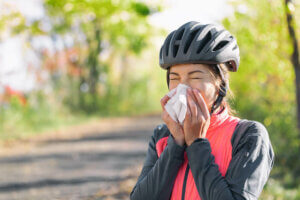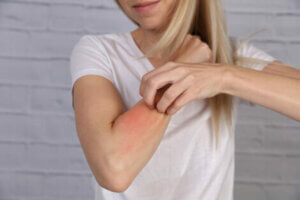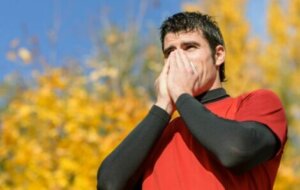Managing Allergies and Outdoor Sports

Managing allergies whilst doing outdoor sports is a common problem. Many people who like to do sports outdoors suffer from rhinitis or skin problems. However, they still want to practice their favorite sport whilst keeping symptoms under control.
Physical activity and sport stimulate the immune system, so in general, it’s good for keeping your allergies in check. However, at some times of the year, such as Spring, there are so many allergens flying around that it can really be a horrible time.
Nonetheless, doctors still recommend outdoor activities as a way to increase tolerance. What this means is that exposure to allergens can desensitize the body and reduce allergic symptoms.
However, despite this advice, it’s still important to take precautions, particularly if you suffer from rhinitis or asthma. And these can be quite simple measures too, like taking a dose from your inhaler before you go out for a run.
Allergic reactions range from mild symptoms to more complex and serious reactions such as an asthma attack. So, if you have any doubts at all, you should speak with your doctor so as not to expose yourself to any serious risks.
Three key factors for managing allergies and outdoor sports
There are three key factors when trying to control your allergies while you exercise outside, and they interact with each other. Some of these may cause something as basic as sneezing, but others can have more serious consequences.
- Weather: the weather conditions when you go outside to exercise is obviously very important. Cold air causes bronchoconstriction and pollen levels can stimulate the nasal receptors. Air pollution also carries allergens. Make sure you always check the forecast before you leave the house to exercise.
- Pre-existing health problems: being an asthmatic is obviously not the same as suffering from dermatitis due to environmental pollution. Asthmatics will be much more exposed than athletes with skin conditions, and the options for preventative medicines and treatments will also vary.
- Type of sport: the type of exercise that you’re going to perform will also be linked to the weather. Skiing obviously takes place in a cold environment whilst you’re likely to go surfing on a hot beach. Furthermore, some sports build in intensity more gradually than others, and this can have an impact on the way that the body reacts.

Use of antiallergic drugs
The use of medications when doing outdoor sports is controversial. Some athletes don’t want to use any drugs at all whilst others don’t have a choice.
The most common options are antihistamines, but, these are known to reduce athletic performance. They also have a range of side effects including drowsiness.
Meanwhile, bronchodilators are a must for asthmatics. Asthmatics should inhale them before any exercise and especially if the weather is likely to make their condition worse. However, since their side effects include a faster heart rate, you should always seek advice from your doctor first.
If you’re a professional athlete, then there are also complex legal aspects. Many antiallergic drugs aren’t allowed and are considered a form of doping.
Recommendations for managing allergies and outdoor sports
If you suffer from asthma, you should speak with your doctor about ways to prevent asthma attacks during exercise. It’s really important and you should definitely not be complacent under any circumstances.
On the other hand, if you suffer from much milder allergies, such as rhinitis or dermatitis, there are some simple steps you can take which will reduce your symptoms and still allow you to exercise outdoors.

One of them is to stay hydrated. The more hydrated you are, the more effective your body’s mucous membranes will be to counteract symptoms such as sneezing and an itchy nose.
Secondly, always check the weather before you go outside and pay special attention to any warnings about pollution or the pollen count. This will help you to avoid exercising when in poor conditions.
Another key thing to consider is cleanliness. According to Salazar Nievas (2017), washing and showering help to remove any allergens that might build up on your skin during exercise. Clothes also get covered in them, so it’s a good idea to change as soon as you get home.
Finally, try to exercise in the afternoon, when the pollen has dropped enough, or after it has rained, when allergens are less likely to be in the air. The morning and drier parts of the day tend to be worse for people with allergies.
Managing allergies whilst doing outdoor sports is a common problem. Many people who like to do sports outdoors suffer from rhinitis or skin problems. However, they still want to practice their favorite sport whilst keeping symptoms under control.
Physical activity and sport stimulate the immune system, so in general, it’s good for keeping your allergies in check. However, at some times of the year, such as Spring, there are so many allergens flying around that it can really be a horrible time.
Nonetheless, doctors still recommend outdoor activities as a way to increase tolerance. What this means is that exposure to allergens can desensitize the body and reduce allergic symptoms.
However, despite this advice, it’s still important to take precautions, particularly if you suffer from rhinitis or asthma. And these can be quite simple measures too, like taking a dose from your inhaler before you go out for a run.
Allergic reactions range from mild symptoms to more complex and serious reactions such as an asthma attack. So, if you have any doubts at all, you should speak with your doctor so as not to expose yourself to any serious risks.
Three key factors for managing allergies and outdoor sports
There are three key factors when trying to control your allergies while you exercise outside, and they interact with each other. Some of these may cause something as basic as sneezing, but others can have more serious consequences.
- Weather: the weather conditions when you go outside to exercise is obviously very important. Cold air causes bronchoconstriction and pollen levels can stimulate the nasal receptors. Air pollution also carries allergens. Make sure you always check the forecast before you leave the house to exercise.
- Pre-existing health problems: being an asthmatic is obviously not the same as suffering from dermatitis due to environmental pollution. Asthmatics will be much more exposed than athletes with skin conditions, and the options for preventative medicines and treatments will also vary.
- Type of sport: the type of exercise that you’re going to perform will also be linked to the weather. Skiing obviously takes place in a cold environment whilst you’re likely to go surfing on a hot beach. Furthermore, some sports build in intensity more gradually than others, and this can have an impact on the way that the body reacts.

Use of antiallergic drugs
The use of medications when doing outdoor sports is controversial. Some athletes don’t want to use any drugs at all whilst others don’t have a choice.
The most common options are antihistamines, but, these are known to reduce athletic performance. They also have a range of side effects including drowsiness.
Meanwhile, bronchodilators are a must for asthmatics. Asthmatics should inhale them before any exercise and especially if the weather is likely to make their condition worse. However, since their side effects include a faster heart rate, you should always seek advice from your doctor first.
If you’re a professional athlete, then there are also complex legal aspects. Many antiallergic drugs aren’t allowed and are considered a form of doping.
Recommendations for managing allergies and outdoor sports
If you suffer from asthma, you should speak with your doctor about ways to prevent asthma attacks during exercise. It’s really important and you should definitely not be complacent under any circumstances.
On the other hand, if you suffer from much milder allergies, such as rhinitis or dermatitis, there are some simple steps you can take which will reduce your symptoms and still allow you to exercise outdoors.

One of them is to stay hydrated. The more hydrated you are, the more effective your body’s mucous membranes will be to counteract symptoms such as sneezing and an itchy nose.
Secondly, always check the weather before you go outside and pay special attention to any warnings about pollution or the pollen count. This will help you to avoid exercising when in poor conditions.
Another key thing to consider is cleanliness. According to Salazar Nievas (2017), washing and showering help to remove any allergens that might build up on your skin during exercise. Clothes also get covered in them, so it’s a good idea to change as soon as you get home.
Finally, try to exercise in the afternoon, when the pollen has dropped enough, or after it has rained, when allergens are less likely to be in the air. The morning and drier parts of the day tend to be worse for people with allergies.
All cited sources were thoroughly reviewed by our team to ensure their quality, reliability, currency, and validity. The bibliography of this article was considered reliable and of academic or scientific accuracy.
- Nievas, María Salazar. Dermatitis atópica: cuidados de la piel. Vol. 42. 3. Ciencias, 2017.
- Soto, D. Antolín Amérigo, et al. Rinitis alérgica. Medicine-Programa de Formación Médica Continuada Acreditado 12.30 (2017): 1757-1766.
- Lisboa, Carmen. Medidas preventivas en el asma bronquial. ARS MEDICA Revista de Ciencias Médicas 16.1 (2017): 76-78.
- Caggiano, Serena, et al. Exercise-induced bronchospasm and allergy. Frontiers in pediatrics 5 (2017): 131.
- Bonini, Matteo, and William Silvers. Exercise-induced bronchoconstriction: background, prevalence, and sport considerations. Immunology and Allergy Clinics 38.2 (2018): 205-214.
This text is provided for informational purposes only and does not replace consultation with a professional. If in doubt, consult your specialist.








